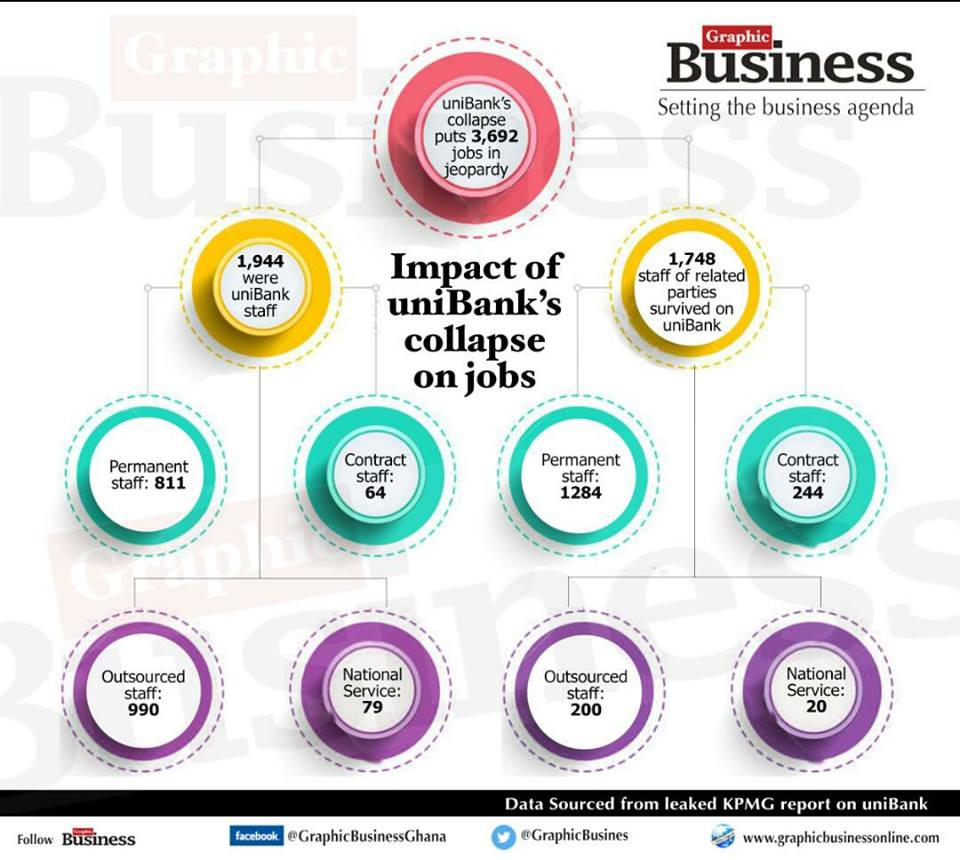The full impact of the August 1, 2018 dissolution of the uniBank Ghana Limited on the nation is coming to the fore, after a leaked report from KPMG revealed that the method used to resolve the bank could cost the state in excess of GH¢4.3 billion.
The bank’s collapse could further threaten the jobs of almost 3,962 persons, thereby jeopardising their livelihoods, the report by KPMG – uniBank’s official administrator (OA) in the lead-up to the dissolution – said.
It explained that while the GH¢4.3 billion is the minimum amount the government needed to recapitalise a new bank (the equivalent of Consolidated Bank Ghana Limited) and cover for the gap between assets and liabilities assumed, the 3,692 people are employees of uniBank and related parties (RPs), whose sources of livelihood were dependent on the now-defunct bank.
As a result, the report said its liquidation on the back of insolvency will mean that “an estimated 3,692 employees may be affected.”
Of the number, 1,944 were directly working with uniBank while 1,748 were working with RP firms as national service personnel, permanent, contract or outsourced staff.
Meanwhile, shareholders of uniBank have cast doubt on the authenticity of the report, explaining that subsequent appointment of KPMG as the receiver of uniBank alongside four other banks amounted to conflict of interest.
Distribution of cost
On the cost, KPMG estimated that a liquidation of uniBank through a new bank will mean that a day-one bond issuance will likely cost “in excess of GH¢4.3 billion.
It explained that the amount will cover for GH¢3.6 billion of deposits and net liabilities assumed by the new bank, balance to cover running losses until the end of the year and GH¢400m minimum capital.
The report also noted that the bank’s strong presence in corporate social responsibility will be lost after due to the dissolution.

Proposed options
In the 277-page report titled; Financial Condition and Future Prospects of uniBank (Ghana) Limited – Updated,’ KPMG proposed six broad options that could be used to handle the bank to prevent its challenges from spilling over into the entire financial sector.
While three of the proposed options were on how to rehabilitate the bank, the remaining three were on how to entirely liquidate the bank, using cost-efficient and non-complex but viable methods.
Although the August 1 dissolution of uniBank through receivership, with newly established Consolidated Bank Ghana Limited, is not exactly similar to any one of the proposed methods, a careful study of the fine details of that transaction vis-à-vis the options proposed shows that it was a fusion of four of the options that the official liquidator suggested to the central bank.
Except for the firm’s options one and two, which proposed a recapitalisation by existing shareholders or a third party investor, the remaining four proposals bordered on a liquidation and/or nationalisation of the bank and a subsequent transfer of selected assets and liabilities to another bank under a purchase and assumption agreement.
Financial status
The report said as of May 2018, uniBank was bedevilled with a myriad of challenges, resulting from a combination of poor corporate governance practices, high cost-income ratio and a deteriorating loan book, which altogether weakened it.
It said the bank had a capital deficit of GH¢7.4 billion compared to a regulatory requirement of GH¢400 million; its liabilities had exceeded assets by 248 per cent, and liquid assets represented just two per cent of the bank’s total assets. This means that the bank had difficulty meeting its payment obligations prior to the dissolution.
The report said with a cost-to-income ratio of 0.7 per cent, uniBank’s operational expenses were higher than the industry average of 0.4 per cent.
It added that 70 per cent of the bank’s gross loans and advances and other assets, translating into GH¢5.3 billion, were granted to related parties – companies and individuals associated with the bank.
Some of the related parties that benefited from loans and advances included LHS Ghana (GH¢199m), Cassel Energy (GH¢188m), uniPrecision Printing (GH¢188m) and EIB Network (GH¢43m).
Liquidation
uniBank was liquidated on August 1 alongside four other banks and their assets and liabilities transferred to newly established Consolidated Bank Ghana Limited.
The new lender was capitalised with GH¢450 million and also issued a bond of GH¢5.76 billion to cover the gap between assets and liabilities that it assumed.

